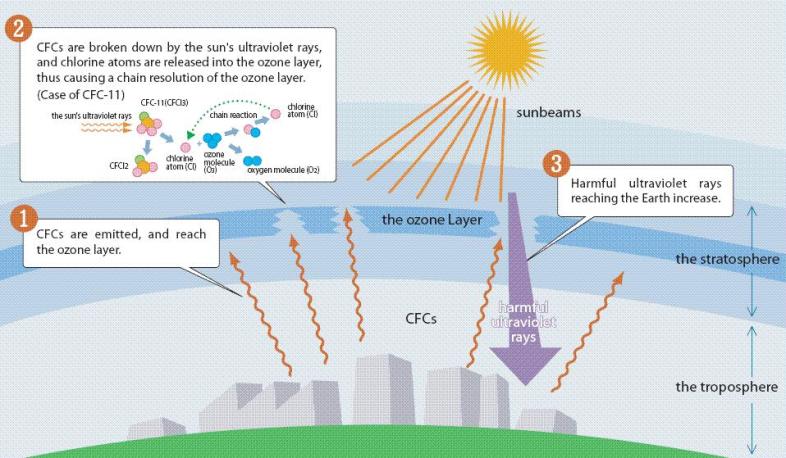- Home >
- Our Actions >
- Ambassador report
8
Comments
[Thematic Report] Calculating the Environment Cost of Using Air Conditioners |
|---|
|
by Troyee Mutsuddy | 19-05-2020 20:37
|
|
Due to global warming, temperature has been rising all over the world, and with that, the use of air conditioners have increased. As the temperature rises, we tend to find relief from the cooling breeze of air conditioners. It may be seemingly harmless, but we can calculate the environmental cost of using air conditioners. Hydrofluorocarbons (HFCs) and Chlorofluorocarbons (CFCs) Hydrofluorocarbons (HFCs) and Chlorofluorocarbons (CFCs) are important cooling agents of air conditioners. These are a group of industrial chemicals that are used for cooling and refrigeration. Even though HFCs are only 1% of the total greenhouse gases, it is a powerful greenhouse gas that contributes to global warming. These are short lived pollutants that live for upto 15 to 29 years in the atmosphere. The use of HFC in air conditioning is popularized from the 1990’s and even though their amount is very limited in the atmosphere, due to global warming and widespread availability of ACs, the use of air conditioning has increased over the years and so had the emission of these HFCs. Older and malfunctioning air conditioners tend to release more of HFCs into the atmosphere. Like other greenhouse gases, these HFCs cause ozone depletion. And since the use of ACs has been increasing, more HFCs are being released in the air, causing more holes in the ozone layer.  Source: The Ozone Hole (http://www.theozonehole.com/cfc.htm) Energy Consumption Air conditions require a lot of energy to use, especially electricity. Air conditioners, depending on the model (from the smallest window unit to central air conditioner) can use upto 500 to 3500 Watts of electricity. With so much electricity consumption, it also creates more pollution as CO2 is released into the air and causes ozone depletion. According to CCAC (Climate and Clean Air Coalition to Reduce Short-Lived Climate Pollutants), the key points to understand are-
However, emission of HFCs and other greenhouse gases from air conditioners can be controlled through a phase down production and consumption. Some researches find HFO (hydrofluoroolefins) as a replacement for HFCs. HFO molecules break down in a few days, so they have less time to trap in heat. Using eco-friendly air conditioners can produce less carbon footprints as well. References: Schlossberg, T. (2016, August 10). How Bad Is Your Air-Conditioner for the Planet? Retrieved May 19, 2020, from https://www.nytimes.com/2016/08/10/science/air-conditioner-global-warming.html Hydrofluorocarbons. (n.d.). Retrieved May 19, 2020, from https://www.ccacoalition.org/fr/slcps/hydrofluorocarbons-hfc |
|
|










 Previous : Thematic report: Calculating t...
Previous : Thematic report: Calculating t...









8 Comments
Hi Troyee Mutsuddy, this is a mentor Sang Su Lee.
Thank you for your detailed data about the cost when one uses air conditioner. I knew that fluoro carbons affect the ozone layers negatively, but I did not know that they also are part of green house gases. In addition, it was marvelous to see that so much energy is consumed when one uses the air conditioner. It will be better if we learn how to be patient, feeling natural breeze in the summer. However, as climate soars up, people become lethargic... prone to rely on the air conditioner more and more. I hope this bad cycle would end soon!
Posted 25-05-2020 19:27
Hello Troyee,
I do hope that you are fine and doing great with your works.
Thank you for your report about Calculating the Environment Cost of Using Air Conditioners
Green Cheers from Nepal :)
Keep writing great reports.
We are eager to read more reports from you.
Regards,
Kushal Naharki
Posted 24-05-2020 22:19
Greetings troyee
I hope you are doing well
I believe appliances like sir conditioners to be luxurious good which can be avoided as well.
Thank you so much for this report
Keep writing
Green cheers
Regards
Asmita Gaire
Posted 22-05-2020 14:45
Hello Troyee!
I hope you are fine and doing great!
Thank you for sharing environmental cost of using air conditioner.Nowadays,more number of air conditioner are being used due to increasing earth temperature.Eco-friendly alternatives should be promoted.
Thanks for sharing!
GREEN CHEERS!
Regards,
Sonika
Posted 20-05-2020 22:09
Dear Troyee Mutsuddy,
Its me Bal krishna from Nepal
Thanks for your detailed report about ydrofluorocarbons (HFCs) and Chlorofluorocarbons (CFCs) and global warming.
yes we can Use eco-friendly air conditioners that can produce less carbon footprints
cheers
g
Posted 20-05-2020 18:46
Hello Troyee!
Thanks for sharing this wonderful report.
People must be concious about global warming.Due to man's choice to live a sophisticated life it causes great harm to the environment which increases green house gas in the environment which results gobal warming.
Keep writing!
Regards,
Manisha
Posted 20-05-2020 18:40
Hello Troyee Mutsuddy, this is mentor Taehyun!
Thank you for the article about the refrigerant in the air conditioner! In fact, CFCs are already banned worldwide in 2010 under the environmental protocol, and these days new refrigerants such as HFC, HCFC, and HFO are being used. Of course, these materials are not perfectly safe, but I can rest assured that they are less likely to destroy the ozone layer compared to the old refrigerant!
Thank you for the report!
Green cheers!
Posted 20-05-2020 15:09
Hello Troyee,
I hope you are doing great
Thank you for sharing about the bad impact of Air condition to the climate.
Keep writing and sharing
Regards
Himani
Posted 20-05-2020 00:52